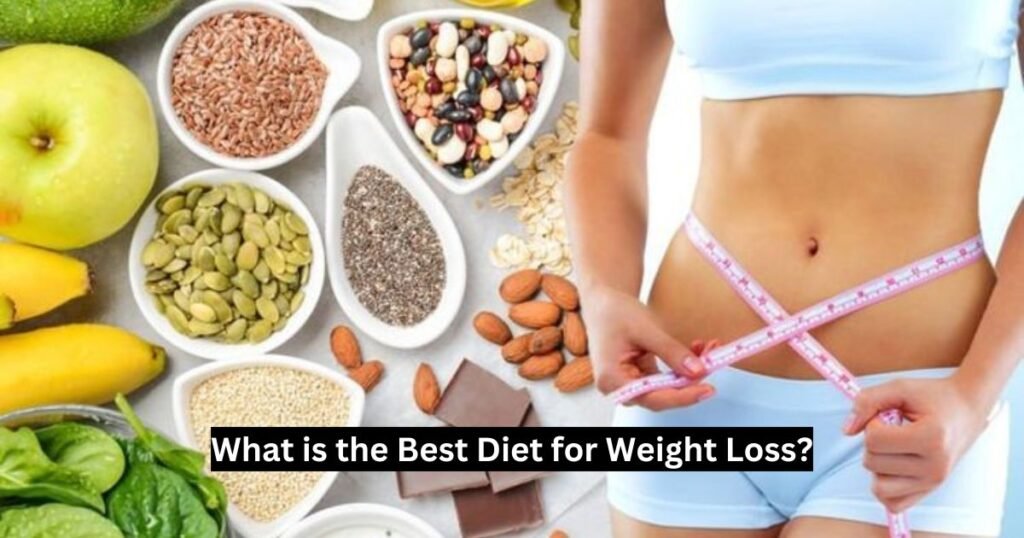While many people aim to lose weight quickly, the most effective weight loss journey is one that’s sustainable and healthy. In 2025, a focus on balanced eating, nutrient-dense foods, and evidence-based practices is key. It’s not just about cutting calories but about creating lasting habits that support your health and well-being.
In this article, we’ll explore the best diets for weight loss, providing a comprehensive overview of popular options. We’ll also help you understand how to choose the right diet for your individual needs, preferences, and lifestyle. Whether you’re looking for rapid results or a more gradual, long-term solution, we have the information you need.

Understanding Weight Loss: The Basics
Before diving into the specifics of popular diets, it’s crucial to understand the foundational concept behind weight loss. Essentially, weight loss occurs when your body uses more calories than it consumes, creating a caloric deficit. This deficit forces the body to burn stored fat for energy, leading to weight loss.
However, it’s not just about restricting calories. The type of calories, the macronutrients (carbs, fats, and proteins) you consume, and the timing of your meals also play significant roles. Choosing the right diet is about understanding how your body responds to various nutrients, and finding an approach that works for your unique physiology.
Caloric Deficit: The key to weight loss is a calorie deficit, but this doesn’t mean drastic cuts. A moderate reduction of 10-20% of your daily intake is often the most effective approach for long-term weight loss.
The Most Popular Diets for Weight Loss in 2025
The following diets have gained popularity for their unique approaches and benefits. We’ll examine each one in detail so you can determine which might be the best fit for you.
The Ketogenic Diet (Keto)
Overview: The ketogenic diet, often referred to as “keto,” is a high-fat, low-carbohydrate eating plan that aims to put the body into a state called ketosis. In ketosis, the body burns fat for energy instead of carbohydrates, leading to rapid fat loss.
How it Works:
- By drastically reducing carbohydrate intake, typically to less than 50 grams per day, your body shifts its primary fuel source from glucose to ketones, which are derived from fats.
- This leads to fat-burning, reduced appetite, and enhanced fat oxidation.
Benefits:
- Rapid weight loss, especially in the first few weeks
- Helps regulate blood sugar and insulin levels, which can be beneficial for people with type 2 diabetes
- Improves mental clarity for some people due to the stable energy provided by ketones
Considerations:
- The keto diet can be difficult to follow, especially in social settings or when dining out
- Nutrient deficiencies (e.g., fiber, certain vitamins and minerals) may occur if the diet is not well-balanced
- The “keto flu” is common when first starting, as your body adjusts to using fat as a primary energy source
Ideal for: People looking for fast weight loss and those willing to embrace a high-fat, low-carb approach to eating.
For more information on how the ketogenic diet works, check out this guide to the keto diet.
Intermittent Fasting (IF)
Overview: Intermittent fasting isn’t about restricting the types of foods you eat; rather, it focuses on when you eat. It involves alternating periods of eating and fasting, with the goal of reducing overall calorie intake while giving your body time to burn fat.
How it Works:
- Common intermittent fasting patterns include the 16/8 method (16 hours of fasting and an 8-hour eating window) or the 5:2 method (eating normally for five days and restricting calories to 500–600 on two non-consecutive days).
- During the fasting periods, insulin levels drop, making it easier for the body to access stored fat.
Benefits:
- Weight loss occurs without the need for calorie counting
- Increases fat burning and improves metabolic health
- Supports the production of human growth hormone (HGH), which promotes fat loss and muscle gain
Considerations:
- May be difficult for beginners, especially if you have a strong attachment to regular meal times
- Overeating during eating windows can negate the benefits
Ideal for: Individuals who prefer flexibility in their eating patterns and want to simplify their approach to weight loss without restrictive calorie counting.
The Mediterranean Diet
Overview: The Mediterranean diet is based on the traditional eating habits of countries bordering the Mediterranean Sea. It emphasizes the consumption of fresh fruits and vegetables, whole grains, lean proteins (mainly fish), and healthy fats like olive oil.
How it Works:
- Unlike more restrictive diets, the Mediterranean diet is about making long-term changes to your eating habits, focusing on nutrient-dense, whole foods.
- The diet is high in fiber and healthy fats, which can improve digestion, reduce inflammation, and support overall heart health.
Benefits:
- Supports sustainable weight loss due to its balanced approach
- Linked to a lower risk of heart disease, stroke, and certain cancers
- Rich in antioxidants, which can reduce inflammation and support cellular health
Considerations:
- Weight loss may be slower compared to highly restrictive diets
- Requires access to fresh, high-quality ingredients
Ideal for: People looking for a balanced and heart-healthy approach to weight loss that can be sustained long-term.
To read more about the Mediterranean diet’s health benefits, check out this scientific review.
The Paleo Diet
Overview: The paleo diet encourages eating foods similar to those available to our hunter-gatherer ancestors. It eliminates processed foods, dairy, grains, legumes, and sugar, focusing on fresh meats, fish, fruits, vegetables, nuts, and seeds.
How it Works:
- The diet promotes the consumption of nutrient-dense, whole foods that are rich in vitamins, minerals, and healthy fats.
- By avoiding grains and dairy, the paleo diet aims to reduce inflammation and support digestive health.
Benefits:
- Promotes fat loss by reducing processed food intake and focusing on lean proteins
- Can improve insulin sensitivity and stabilize blood sugar
- Encourages better eating habits by eliminating unhealthy food groups
Considerations:
- The paleo diet may feel restrictive due to the exclusion of several food groups
- Can be more expensive due to the emphasis on high-quality meats and organic produce
Ideal for: Individuals who prefer a whole-foods approach and want to avoid processed foods for improved health.
Key Factors to Consider When Choosing a Weight Loss Diet
Choosing the right diet for weight loss is a personal decision. While each diet has its unique benefits, it’s essential to consider the following factors:
1. Your Lifestyle and Preferences
The best diet is one that aligns with your lifestyle and eating preferences. If you prefer a structured eating schedule, intermittent fasting may be a good choice. On the other hand, if you enjoy variety and flexibility, the Mediterranean diet may suit you better. Choose a diet you can commit to without feeling deprived.
2. Sustainability
Long-term weight loss success comes from maintaining a sustainable eating pattern. Extreme diets that offer quick results may not be sustainable, leading to yo-yo dieting. Look for a plan that you can maintain for the long term without significant food restrictions.
3. Nutritional Balance
Ensure your chosen diet provides essential nutrients like vitamins, minerals, and fiber. A diet that severely restricts certain food groups can lead to nutrient deficiencies and health issues.
4. Physical Activity Level
Physical activity plays a vital role in weight loss. Combine your chosen diet with regular exercise to enhance fat burning and maintain muscle mass. Strength training, in particular, can help increase metabolism and prevent muscle loss while losing weight.

Maximizing Weight Loss Success
To make the most of your chosen weight loss diet, consider the following strategies:
1. Monitor Your Progress
Track your food intake, workouts, and progress over time. Journaling or using an app can help you stay accountable and make necessary adjustments.
2. Stay Hydrated
Water plays a critical role in metabolism and digestion. Staying hydrated can support your weight loss goals and reduce hunger.
3. Prioritize Sleep and Stress Management
Getting enough sleep and managing stress levels are essential for weight loss. Chronic stress and lack of sleep can lead to emotional eating and overeating, hindering your progress.
See Also: gossiips.com
Conclusion
When it comes to weight loss, the best diet is the one that fits your lifestyle and long-term health goals. Whether you choose keto, intermittent fasting, the Mediterranean diet, or paleo, ensure that your diet is balanced and sustainable. Combining a healthy eating plan with regular physical activity and other lifestyle factors like sleep and stress management will set you up for success.



